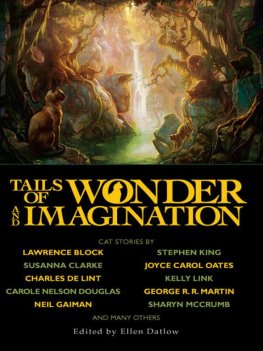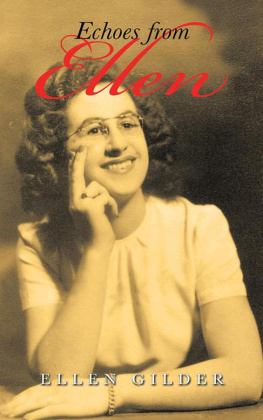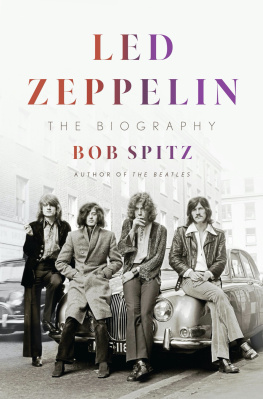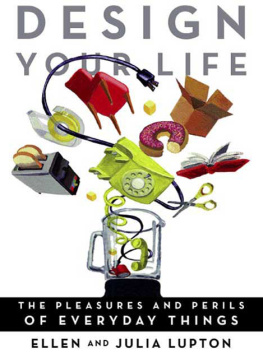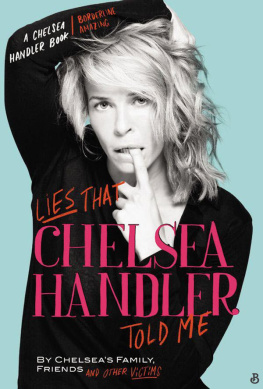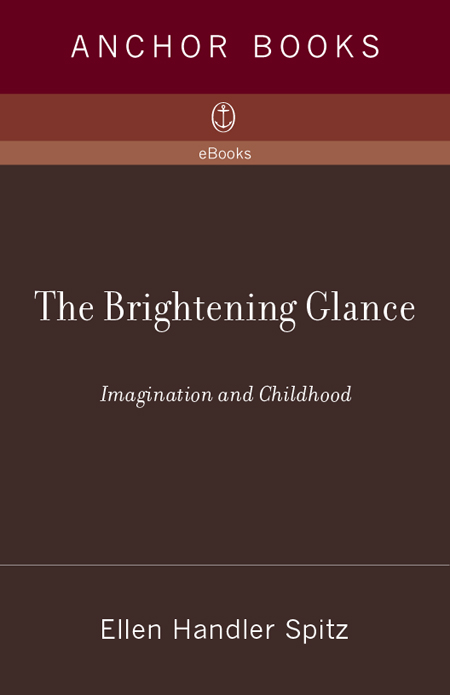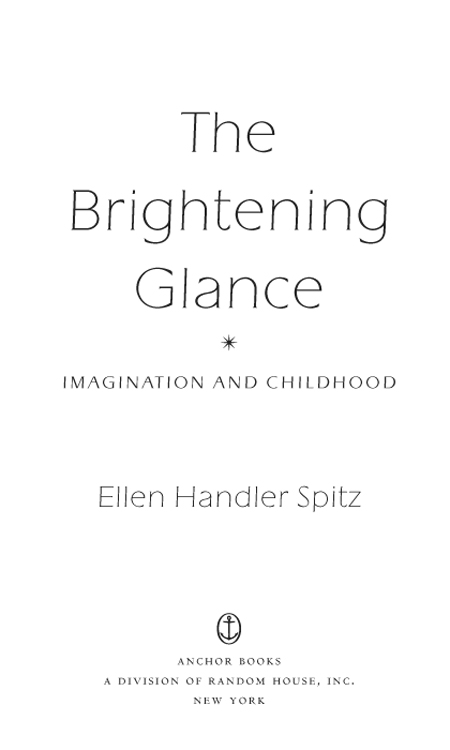Acclaim for Ellen Handler Spitz's
The Brightening Glance
Spitz is our expert on mapping the contact zone between children and adults. She guides us with passion and clarity through key episodes in children's lives, reminding us in the process of our own damaged sense of wonder even as she offers sound advice on how to repair it.
Maria Tatar, author of The Annotated Brothers Grimm and Off with Their Heads!: Fairy Tales and the Culture of Childhood
The wealth of real-life stories makes theory come to life in this readable, understandable, and useful book. Spitz helps parents and professionals to see the arts through the eyes of a childand to approach the arts in ways that meet the real needs of children.
Hedda Sharapan, Director of Early Childhood Initiatives, Family Communications, Inc., producers of Mister RogersNeighborhood
The Brightening Glance is not just a great book for parents, but also for favorite aunts. It isn't a guidebook to getting your child into an elite school, but heeding Spitz's suggestions could make your son or daughter the sort of student that admissions officers can't resist.
M. G. Lord, author of Forever Barbie: The Unauthorized Biography of a Real Doll
Spitz captures how cultural and aesthetic experiences animate and deepen the inner worlds of childhood and shape memory and affect throughout life. Spitz provides a strong argument for the old-fashioned projects of reading and singing to children, playing music for them, giving them paints and clay, and providing them access whenever possible to the pleasures of high culture.
Nancy J. Chodorow, psychoanalyst and author of The Reproduction of Mothering
A beautifully written and highly intelligent book. Dr. Spitz investi gates how children incorporate their day-to-day experiences with culture into their own unique set of values and preferences. All par ents, teachers, as well as any grown-up interested in nurturing the creative spirit of a young child would be well-advised to own and read this book.
Vibiana Bowman, President of the Library Instruction Round Table of the American Library Association
What can children teach us about art? A great deal, because children love truth and are very good at detecting lies. Ellen Handler Spitz is a great writer because she loves art and knows children, and because she always speaks from the heart.
David Carrier, Champney Family Professor, Case Western Reserve University/Cleveland Institute of Art
Spitz continues to deepen our understanding of the minds of children. She offers sage advice as to how adults can communicate with delicacy and effectiveness between their world and that of children. This book is a must-read for anyone interested in children's aesthetic experience, education, and cross-cultural communication.
Pradeep A. Dhillon, Editor, The Journal of Aesthetic Education
This book will help parents become more attuned to their children's imaginative lives and foster their own and their children's creativity.
Naomi Siegel, M.S., parenting educator, therapist, Co-Director of Parenting Conversations
Wow. What a book. It is outstanding, thought-provoking, and above all, an invitation to look closely at what is often overlooked.
Rachel Weaver Rivera, Imagine Art Studio

ELLEN HANDLER SPITZ
The Brightening Glance
A native New Yorker, Ellen Handler Spitz lectures internationally on the arts and on children's cultural lives. She is the author of four previous books, including Inside Picture Books. An artist and former dancer, she holds a doctorate from Columbia University in philosophy and the social sciences. She has been awarded major fellowships and prizes, including fellowships from the Getty Center, the Bunting Institute, the Clark Institute, and the Camargo Foundation. She is currently Honors College Professor of Visual Arts at the University of Maryland, where she teaches interdisciplinary seminars in the humanities. She lives in Baltimore.
ALSO BY ELLEN HANDLER SPITZ
Inside Picture Books
Museums of the Mind
Image and Insight
Art and Psyche
FOR MY CHILDHOOD FRIEND JOANNA
O body swayed to music, O brightening glance,
How can we know the dancer from the dance?
WILLIAM BUTLER YEATS,
Among School Children
Contents
1.
2.
3.
4.
5.
6.
7.
8.
A Note to My Reader
As a writer on the arts, I have often felt curious about the role of imagination and of early aesthetic experience in shaping the lives of those who work in fields of special interest to me and in far-flung disciplines as well. I know the beginnings lie in childhood, when nothing can be taken for granted. For nearly all my adult life I have had the good fortune of being close to certain children. This book, inspired by them and by countless writers and artists only some of whose works are acknowledged in these pages, takes that curiosity as a springboard for eight chapters, eight leaps. Yet ever since, as a Brownie scout growing up in New York, I defied my diminutive size to compete in a track event known as the running broad jump, there's been a bit of the daredevil in me, and perhaps this book could be seen as an intellectual adult equivalent of that once beloved sport. Then as now, the pleasure comes from trying rather than winning.
As a fellow at the Sterling and Francine Clark Art Institute in the Berkshire hills during the summer of 2004, I was blessed with a tranquil, verdant refuge in which to write. One day, in conversation with several colleagues, over a glass of wine, I began to muse about you, my unknown reader, and to wonder how you might take to the pages that follow. Very soon, you will know that I have written about what I love. I have made an effort to open gates to a land without borders. Just kick up your heels and sprint in meadows spangled with clover and devils paintbrush, where invisible frogs burp and sunbeams glint on the Queen Anne's lace. Let's imagine; I'll be with you.
Chapter One
The Magnifying Gaze of Children
It is hardly worth the effort to try to grow up into and live fully withina world that is not full of wonder.
Bruno Bettelheim, Children and Museums
Brooding, she changed the pool into the sea, and made the minnows into sharks and whales, and cast vast clouds over this tiny world by holding her hand against the sun, and so brought darkness and desolation, like God himself, to millions of ignorant and innocent creatures, and then took her hand away suddenly and let the sun stream down.
Virginia Woolf To the Lighthouse
Spaceman Spiff and Rapunzel at the Ballet
As childhood recedes in time, it steals in closer and feels more palpable. Like a lost toy that has slipped into a cranny, it suddenly turns up. You want to hold on to it again. Thus, my own childhood intrudes sometimes into these pages. Because of this stealing back of memory, you will find, in this book, impressions, recollections, even an occasional bit of exhortation. My wish is to take you back to moments in your own childhood as well as to invite you to consider matters that confront young children today. For childhood is, after all, not only the start of life; it stays with us, follows us, and continues to survive as a realm to which we return. Perhaps, moreover, the artists are right, and returning purposefully to it from time to time can inspire us to continue to grow.


